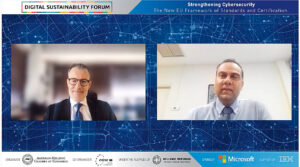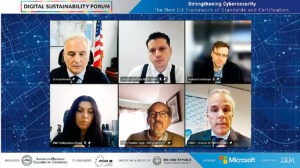Bringing together key policymakers, industry leaders and experts, the fourth Digital Sustainability Forum looked at one of 2021’s foremost cybersecurity developments, examining its ins and outs and looking at the real impact that the new scheme can have for businesses of all sizes in Greece and across the European Union.

Nikolaos Bakatselos, Athanasios Staveris-Polykalas
With a focus on the EU’s ambitious new Cybersecurity Act, the Cybersecurity Certification Framework and the European Cybersecurity Certification Scheme for Cloud Services (EUCS), the American-Hellenic Chamber of Commerce convened its 4th Digital Sustainability Forum on March 31, 2021, as a fully digital event. The event was organized in cooperation with the European Union Agency for Cybersecurity (ENISA) under the auspices of the Ministry of Digital Governance of the Hellenic Republic. It was sponsored by Microsoft and further supported by IBM.
“With the EUCS, the EU has the potential to create a powerful tool that builds trust, enhances security, and supports risk management for cloud services in Europe. The market adoption of the EUCS will depend on its workability and cost effectiveness; its voluntary application; its alignment with existing, internationally recognized certifications and standards; and, most importantly, its ability to provide a single European cybersecurity benchmark for cloud service providers across Member States.”
– Aliki Foinikopoulou, Director of Government Affairs and Public Policy, EU at Salesforce;
Vice Chair of the Digital Economy Committee and the Diversity and Inclusion Taskforce at AmCham EU
Under the title “Strengthening Cybersecurity: The New EU Framework of Standards and Certification,” the Forum looked at the key attributes of cybersecurity certification of ICT products, processes and services in the EU, provided key background information on the development of cybersecurity certification schemes, highlighted the impact and benefits of adopting the new standards and obtaining certification, and examined the new framework’s relevance and impact on business, entrepreneurship and economic growth.
“The advantage is that we have this harmonization and hopefully defragmentization of schemes and of national requirements, such that the innovation that can take place in the security area can take place above a basic level.”
— Andreas Fuchsberger, Standards Officer, Microsoft’s Corporate Standards Group
The 4th Digital Sustainability Forum brought together a number of distinguished speakers, industry experts, policy leaders and other stakeholders to discuss these key issues. The events speakers were Aliki Foinikopoulou, Director of Government Affairs and Public Policy, EU at Salesforce; Vice Chair of the Digital Economy Committee and the Diversity and Inclusion Taskforce at AmCham EU; Andreas Fuchsberger, Standards Officer at Microsoft’s Corporate Standards Group; Theodosis Michalopoulos, CEO of Microsoft Greece, Cyprus and Malta; Andreas Mitrakas, Head of Unit, Market, Certification and Standardization, at the European Energy for Cybersecurity (ENISA); Athanasios Staveris-Polykalas, Secretary General for Telecommunications and Posts at the Ministry of Digital Governance; Spyros Poulidas, CEO of IBM Greece and Cyprus; Konstantinos Rotas, Head of Regulatory Compliance and Strategic Planning, Directorate for Cybersecurity Strategic Planning, at the National Cybersecurity Authority of Greece; Jonathan Sage, Cybersecurity Policy Lead at IBM Europe; Despina Spanou, Head of Cabinet of the Vice-President of the European Commission Margaritis Schinas; and Eric Vetillard, Lead Certification Expert at the European Energy for Cybersecurity (ENISA); as well as the American-Hellenic Chamber of Commerce’s President, Nikolaos Bakatselos, and Executive Director, Elias Spirtounias.

Elias Spirtounias, Konstantinos Rotas, Andreas Fuchsberger, Aliki Foinikopoulou, Jonathan Sage, Andreas Mitrakas
“This is about market adoption and market success as well as regulation, and it’s imperative that the scheme for the entrance for the small providers is accessible and valuable.”
— Jonathan Sage, Cybersecurity Policy Lead, IBM Europe
“As contemporary cloud technologies evolve, cloud cybersecurity constitutes an important priority for European and national policies. In this spirit, the implementation of the EU Cybersecurity Act paves the way to better address eminent challenges, tackle discrepancies, and provide confidence in the EU single market. Acknowledging these developments, the National Cybersecurity Authority of Greece has issued the National Cybersecurity Strategy 2020-2025, a new strategy with detailed policy objectives and flagship activities, aligning with fundamental EU policy priorities.”
— Konstantinos Rotas, Head of Regulatory Compliance and Strategic Planning, Directorate for Cybersecurity Strategic Planning, National Cybersecurity Authority of Greece

